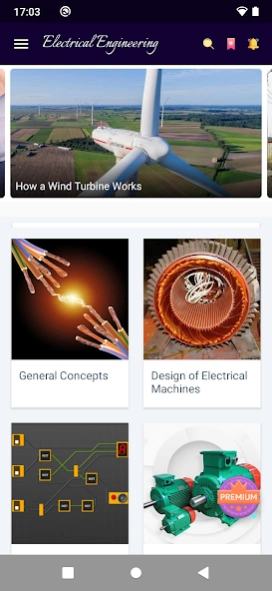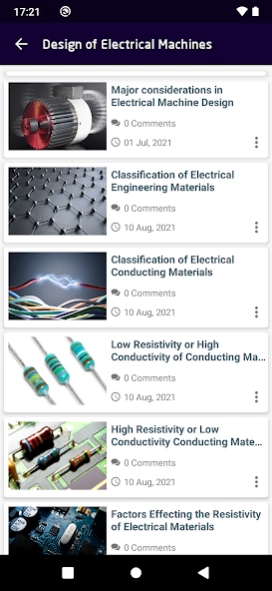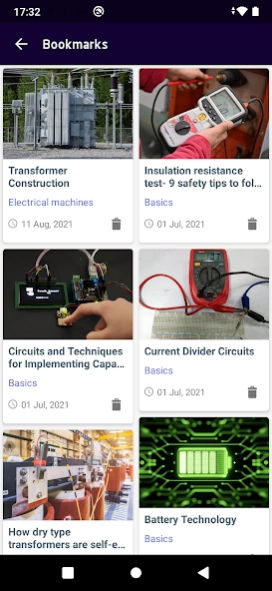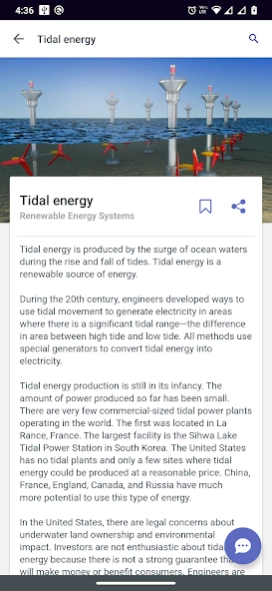Electrical Engineering 5.6.1
Free Version
Publisher Description
Electrical Engineering - Get all the details about Electrical Engineering..
✴Electrical engineering is the study of electromagnetism, electricity and electronics. This electrical engineering App is better explaining these concepts and basics of electricity.The App is designed for easy learning, revisions, references at the time of exams and interviews. This app cover most of related topics and Detailed explanation with all the basics topics. Be a professional with this app. This app is for all engineering students and professionals across the world. ✴
►In this App, you will learn topics such as Inductance and Capacitance, Transients, Steady-State Sinusoidal Analysis, and Frequency Response, Bode Plots, and Resonance plus much more.Comprehensive handbook detailing the application of electrical engineering to the oil, gas , petrochemical industries and offshore industries. These have significantly different characteristics to large-scale power generation and long distance public utility industries. An essential reference for electrical engineering students, designers, operations and maintenance engineers and technicians.☆
【Few Important Topics covered in this App are Listed Below】
⇢ What Is Electrical Engineering
⇢ Nature of Electricity
⇢ Norton Theorem
⇢ Classification of Engineering Materials
⇢ Why Measure Voltage?
⇢ Battery Technology
⇢ What is black Body?
⇢ Power Plants and Types
⇢ Control Engineering
⇢ Electrical Power Transformer
⇢ Electrical Motor
⇢ Induction Motor
⇢ DC Motor or Direct Current Motor
⇢ Alternator Synchronous Generator
⇢ Electrical Switchgear Protection
⇢ Digital Electronics
⇢ What is Electrical Drive?
⇢ Kirchhoff’s Voltage Law (KVL)
⇢ Current Divider Circuits
⇢ What Is LiDAR and How Can I Use It?
⇢ Modelling the Pulse-Width Modulator
⇢ Switching Losses: Effects on Semiconductors
⇢ An Intro to Multiplexing: Basis of Telecommunications
⇢ Boolean Identities
⇢ A Practical Introduction to Operational Amplifiers
⇢ eMMCs: An Introduction
⇢ Universal Logic Gates
⇢ Understanding and Applying the Hall Effect
⇢ Introduction to Operational Amplifiers
⇢ AC Phase
⇢ Diodes and Rectifiers
⇢ Negative Feedback
⇢ Understanding Illuminance: What’s in a Lux?");
⇢ Measuring and Calculating Lux Values
⇢ Measuring and Calculating Lux Values, Part 2
⇢ Characteristics of Operational Amplifiers
⇢ The Inverting Configuration of an Amplifier
⇢ Non-inverting Configuration of an Operational Amplifier
⇢ Characteristics of Junction Diodes
⇢ Electric Fields and Capacitance
⇢ Factors Affecting Capacitance
⇢ Introduction to Capacitive Touch Sensing
⇢ Circuits and Techniques for Implementing Capacitive Touch Sensing
⇢ Analysis of Forward Conducting Diodes
⇢ How Sensor Fusion Works
⇢ Generation, Transmission and Distribution of Electric Power
⇢ Thermal, hydel & nuclear power stations
⇢ Transmission of power
⇢ Single line representation of power system
⇢ Solution of Electric Circuit Based on Mesh (Loop) Current Method
⇢ Solution of Electric Circuit Based on Node Voltage Method
⇢ Examples of Electric Circuit Based on Node Voltage Method
⇢ Wye (Y) - Delta (∆) OR Delta (∆)-Wye (Y) Transformations
⇢ Conversion from Delta (Δ) to Star or Wye (Y)
⇢ Application of Star (Y) to Delta (Δ) or Delta (Δ) to Star (Y) Transformation
⇢ Examples of Star (Y) to Delta (Δ) or Delta (Δ) to Star (Y) Transformation
⇢ Superposition Theorem in the context of dc voltage and current sources acting in a ⇢ ⇢ resistive network
⇢ Application of superposition theorem
⇢ Example of superposition theorem
⇢ Limitations of superposition Theorem
⇢ Thevenin’s and Norton’s theorems in the context of dc voltage and current sources acting in a resistive network
⇢ The procedure for applying Thevenin’s theorem
⇢ Maximum Power Transfer Theorem
⇢ Study of DC transients in R-L and R-C circuits
⇢ Inductance calculation from physical dimension of coil
⇢ Study of dc transients and steady state response of a series R-L circuit.
⇢ Energy stored in an inductor
⇢ Capacitor and its behaviour
⇢ Response of a series R-L-C circuit due to a dc voltage source
About Electrical Engineering
Electrical Engineering is a free app for Android published in the Teaching & Training Tools list of apps, part of Education.
The company that develops Electrical Engineering is Softecks. The latest version released by its developer is 5.6.1.
To install Electrical Engineering on your Android device, just click the green Continue To App button above to start the installation process. The app is listed on our website since 2024-03-16 and was downloaded 2 times. We have already checked if the download link is safe, however for your own protection we recommend that you scan the downloaded app with your antivirus. Your antivirus may detect the Electrical Engineering as malware as malware if the download link to com.softecks.electricalengineering is broken.
How to install Electrical Engineering on your Android device:
- Click on the Continue To App button on our website. This will redirect you to Google Play.
- Once the Electrical Engineering is shown in the Google Play listing of your Android device, you can start its download and installation. Tap on the Install button located below the search bar and to the right of the app icon.
- A pop-up window with the permissions required by Electrical Engineering will be shown. Click on Accept to continue the process.
- Electrical Engineering will be downloaded onto your device, displaying a progress. Once the download completes, the installation will start and you'll get a notification after the installation is finished.



